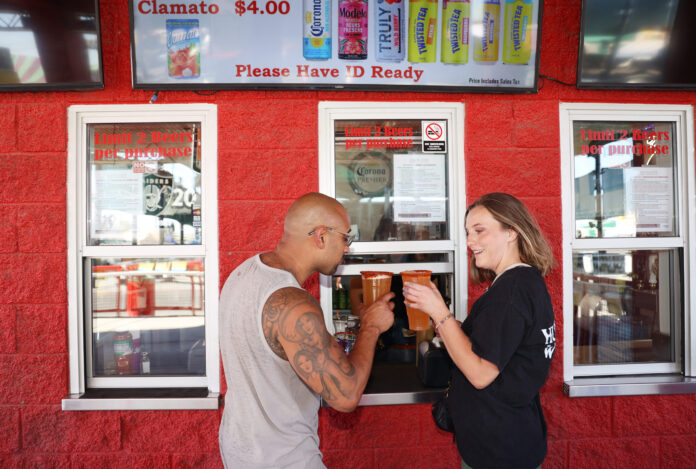As the sun beat down relentlessly on a sweltering Friday afternoon, the atmosphere at Broadacres Marketplace in North Las Vegas buzzed with a unique mix of apprehension and excitement. Among the first in line for the swap meet’s reopening were David Martinez and Mallory Davis, lifelong patrons who had a singular mission: to order an ice-cold michelada. Their enthusiasm mirrored that of many others who had eagerly awaited this moment, particularly after the unanticipated closure that left the community reeling just a few weeks prior.
The temporary shutdown was a proactive measure by Broadacres management following a concerning ICE raid at a similar outdoor market in California. Faced with the potential for community disruptions and vendor uncertainty, management opted to close effectively, prioritizing the safety of both vendors and customers. Martinez reflected on this decision, expressing appreciation for the sacrifices made by the marketplace: “I’m proud of them for that ’cause I know they ate a lot in their pockets for that. It’s honorable and respectful.”
Announcing the reopening via social media, Broadacres made it clear that the vendors were at the heart of the decision. “We are reopening because our vendors are ready — and they deserve a marketplace that has their back,” read the message. In preparation for this moment, the management took steps to enhance the safety and security of their vendors, calling in legal experts to devise a new vendor protocol system. This initiative aimed to provide real-time information regarding any law enforcement activity in and around the area — a necessary reassurance for the vendors eager to restart their livelihoods.
Alongside new protocols, Broadacres introduced educational materials about rights and responsibilities during interactions with law enforcement. Collaborating with the ACLU of Nevada, they offered “Know Your Rights” training sessions for vendors and customers alike, ensuring a well-informed community. Digital signs displaying information from legal organizations created a visible presence of support throughout the market.
To celebrate the reopening and draw in customers, Broadacres introduced discounted entrance fees—just $2 for a limited time—a small gesture in a bid to rejuvenate enthusiasm amongst the community. The changes were met with cautious optimism; Martinez and Davis were not just there for the drinks but to witness the resilience of their beloved marketplace as they grabbed their first micheladas. “This is a historic moment,” Martinez remarked, humorously acknowledging the significance of the reopening.
Yet, lingering fears shadowed this energetic return. While Broadacres had not been directly targeted by ICE, growing enforcement actions had sown anxiety throughout Nevada’s immigrant community, which numbers approximately 600,000. İn recent months, ICE arrests in the state had surged nearly 300% compared to the previous year, further fueling anxiety among vendors and local residents.
Athar Haseebullah, executive director of the ACLU of Nevada, emphasized that while immigration enforcement isn’t universally prohibited at Broadacres, businesses can take steps to ensure safety. As discussions of ongoing efforts to support vendors continued, positive sentiments were mixed with caution—the atmosphere still tinged with uncertainty.
On the vendor front, apprehension about customer turnout loomed large. Ana Bernal Hernández, who assists with her family’s food business, shared the initial hesitation her parents felt about reopening, particularly after hearing about an ICE raid nearby. Ultimately, they decided to face their fears and reclaim their space at the market. “If we aren’t on the frontlines, who are we to ask people to go?” she mused, capturing the spirit of resilience among vendors.
Despite the challenges faced during the closure, many vendors remained hopeful for a strong comeback. Bernal Hernández noted that they decided to reopen only one of their two stands initially, testing the waters to see if familiar faces would return. Her statement underscored a common sentiment: “We obviously don’t expect the same numbers we had prior to the close, but we want to see if people will show up.”
The impact of the temporary closure reached beyond Broadacres, affecting nearby businesses like Raul Contreras’ used appliance store. Newly opened just before the shutdown, Contreras found himself grappling with the reality of reduced customer traffic. “We didn’t get anything because the swap meet closed,” he said, humorously recounting the challenges he faced as a newcomer to the market landscape.
Despite the obstacles, hope lingered in the air. As the evening sun began to set, businesses reported picking up steam, with lines forming at various stalls. It seemed the community was willing to support its local vendors despite the palpable fears that remained. Alfonso Bernal, co-owner of Gorditas El Fogón, echoed the commitment of those running food stalls: “We are here to serve them with great pleasure,” he declared, urging patrons to embrace the renewed spirit of the marketplace.
Yet amidst this optimism lay an undertone of caution, particularly regarding the safety of all involved. Bernal expressed the unease felt by not just vendors but employees too, voicing a poignant sentiment common to many in the area: “We are all afraid … that they can treat us like criminals even though we aren’t. We are people who work, we are useful, we produce.” His words encapsulated a community grappling with the complexities of their existence in an unpredictable environment.
In this dynamic and evolving narrative, Broadacres Marketplace continues to serve as a vital hub for culture, commerce, and community resilience. As vendors and customers navigate these tricky waters, their shared experiences reflect a powerful testament to not just survival, but steadfast support for one another.
